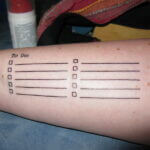37 Memory Techniques to Do Better on Class and Exam Days

Many people make the mistake of thinking memory is something you are either born with or not. This could not be further from the truth.
Like a muscle, the more you “work it out” the stronger it gets. While the following list of memory techniques are extensive, they’re hardly complete.
See which of these you can add to your arsenal, and do feel free to leave your own suggestions in the comments section below.
1. Eat better.
The foods you eat produce different types of effects on your body and mind. Just like you can eat some foods that make you feel sick or “yucky” — special thanks to toddler child — there are foods that do the same or the opposite for your brain.
Here are some examples of good foods, courtesy WebMD.
Here are some examples of gross foods, courtesy Grandparents website (and honestly, who would know better than them?).
2. Eliminate sugar.
While we touched on this generally in memory technique numero uno, it is worth calling out sugar individually.
Added sugar can reek havoc on your body, leading to unpleasant details like obesity and diabetes. The sad thing is food manufacturers these days put it in everything.
Even when you think you’re not getting added sugar through consumption of a health-conscious protein bar, you’re really taking in gram after gram of the damaging substance.
And don’t think for a minute you can just go sugar-free and replace it with artificial sweeteners. Your body has no idea what to do with these alternatives, and it usually leads to cravings and overeating of other sugar-dense foods.
3. Eliminate trans fats.
If you love lots of butter on your movie theater popcorn, well, we hate to break it to you, but you’re consuming oodles of trans fats — one of the most damaging health components in the modern diet.
Here are some things trans fats can do to your body.
Here are other foods that come loaded with trans fats. Avoid both at all costs.
4. Get rid of MSG.
Ever wonder why you feel on-edge after sushi? It’s probably because you’re drenching it in soy sauce, which is a huge MSG offender.
MSG stands for Monosodium Glutamate, and it can lead to headaches and allergic reactions. Fried foods are terrible for MSG, so cut it out if you don’t like the effects.
5. Choose the right times to bring in caffeine. (Hint: It’s not when you think.)
Caffeine is not necessarily a bad thing. Anyone who thinks it is has never met my wife before she’s had her morning coffee.
It can give us a little extra pep in the step — a mental boost that enables us to tackle the less than desirable aspects of our day.
But when you consume caffeine can play an enormous part in your ability to function throughout the day. Your body produces a much-needed substance referred to as cortisol naturally.
Cortisol on its own gives you the energy and clarity of mind to start your day right, but when you bring in caffeine, it starts to tamper with natural cortisol production.
Before long, the body scales back because it assumes you’re going to get that material from someplace else — notably the caffeine-laced coffee you’re consuming each morning.
The problem here is that you have to keep pumping coffee down your gullet if you want to stay energized, but after a while, you will get used to the effects and it won’t provide you with the requisite amount of energy.
When that happens, you won’t have the cortisol to fall back on because, remember, your body thinks you don’t need it anymore on account of the caffeine. Eventually you will get to a point where you can drink caffeinated coffee right before bed, and it won’t keep you up.
Great if you’re wanting to go to sleep, but not so great when you need the energy boost early in the A.M.
For more on the relationship between coffee and cortisol, check out this post from Bulletproof.
6. Consume ‘iffy’ things like alcohol in moderation.
Many will tell you to avoid alcohol at all costs. While that is not a bad idea, it is not a realistic one either. Chances are pretty good that you will be partaking throughout your life.
Therefore, it is important to learn moderation. By allowing yourself to partake within limits, you can avoid the meltdowns that many students have when they taste it for the first time.
New drinkers have a tendency to assume they’ll never get another opportunity to partake, or that they will have to hide it behind the backs of random authority figures.
As a result, when they get a chance, they go crazy. But not you. Want a glass of wine (and are of legal age)? Have one. But leave it at that. Moderate living will ensure you always have the vitals needed to use and improve your memory.
7. Incorporate the Mediterranean diet.
According to HelpGuide, the Mediterranean diet consists of “large quantities of fresh fruits and vegetables, nuts, fish and olive oil — coupled with physical activity,” which “reduces the risk of heart disease, certain cancers, diabetes, Parkinson’s and Alzheimer’s diseases.”
8. If you must use supplements, go with Omega-3s.
Supplements should not be your go-to, but your last resort. Everything you get from a supplement can be pulled from the foods you eat.
Nevertheless, there will be times when your diet falls short of what it needs to be. At those times, it’s good to have a supplement on-hand. Just make sure the ones you choose are Omega-3s.
Here’s why Omega-3s make for the best supplements. (Hint: they may be able to help lower blood pressure and reduce triglycerides.)
9. Work in a multivitamin.
Same applies to multivitamins. Your body needs a certain amount of them to operate at full capacity. Problem is, very few of us actually get that granular when it comes to food tracking.
In other words, we have no idea where we stand when it comes to vitamin deficiencies unless there is an obvious problem. Why wait for symptoms to show up?
Take a One-A-Day, but do try to eat vitamin-rich foods. Here are 25.
10. Try other memory supplements … can’t hurt!
A memory supplement like Gingko Baloba is not going to kill you. The longterm effects on your memory may be debatable, but if it helps, why not considering that it is naturally occurring and has few if any side effects.
Other noteworthy memory supplements you may wish to try out include the following:
- Acetyl-l-Carnitine
- Alpha GPC
- Bacopa Monnieri
- Citicoline
- Curcumin
- Ginseng
- Huperzine A
- Magnesium L-Threonate
11. Exercise.
We know you are getting antsy. “I thought you said these were memory techniques!” Well, they are in the sense that they optimize your brain to better retain information.
That said, fret not. Exercise is the last of our memory techniques that pertain directly to health and diet advice.
When you exercise routinely, you release endorphins that help your brain focus more clearly and find more energy for whatever mental tasks that lay ahead.
Ever wonder why if you work out right before bed, you can’t fall asleep right away? It’s because your mind is racing. Annoying at bedtime, but highly useful when you have to study for an exam.
12. Take it outside.
It may sound goofy and mystical to tell you this, but it’s absolutely true that light can have positive health benefits, especially when talking about brain power.
There have been studies to show as much. Here’s just one example.
13. Do one thing at a time.
“I’m a great multitasker!” Baloney. No one is. Not you. Not your best friend who thinks she is. Not your Uncle Dave or Aunt Harriet.
We can definitively call BS on all such claims because there have been clinical studies done that show human beings to be quite awful at it. Whenever someone can point to success with their multitasking, they’re usually proving our point.
That’s because what they think is multitasking is, in reality, switch-tasking. They’re switching their focus rapidly from one thing to another, but in those moments, their full attention is on one thing, not two or more.
14. Get a good night’s sleep.
Sleep is where your body heals itself. That doesn’t just go for the physical but for mental as well.
When you don’t get sufficient sleep, it can create massively damaging effects over the long haul.
And if you are not convinced of that, allow us to point you here. You should be getting eight hours of sleep per night on average. The give-or-take is about two hours max. More on this later in the post.
15. Play games that require brainpower.
Ever catch yourself playing Sudoku or doing a crossword puzzle and think, “I’m just wasting time, aren’t I?” Great news. You’re not.
You are actually preparing your brain to solve difficult problems. To think outside the box and challenge itself beyond what might have previously been thought possible.
Aside from the brain games we’ve already mentioned here, you might try word scrambles, mazes, and even smartphone classics like Words with Friends and Tetris.
By making your brain confront problems in a fun and challenging way, you are warming it up for more complex problems that occur while trying to learn new materials.
16. Master a new skill.
Mastering a new skill is an underrated selection on this list of memory techniques, because it’s one of the few things that could have a direct impact on the upward trajectory of your career.
When you are thinking of a new skill to master, you should consider starting with something that will have direct relevance on society in the future.
Becoming a master at cursive handwriting may not be the best expenditure of time, at least in career terms!
Instead consider downloading apps like Duolingo or Py and trying your hand at a new language or learning to code. Even if that is not your strong suit and you never become a master at it, the added familiarity will make you more malleable in a career sense.
17. Stop relying so much on technology.
While it may see hypocritical to be saying this right after we told you to stay relevant and download smartphone apps to improve your knowledge base and sharpen your memory techniques, it really isn’t.
Or maybe it is, but who cares?
Bottom line is, too much technology can cause your brain to become lazy. It can strain the eyes and negatively affect human relationships and your ability to relate in formal settings.
By slicing time out of your technology consumption, you will be able to better connect with the outside world and become more effective at maneuvering within it.
18. Learn a second language … or third or fourth.
It’s worth mentioning Duolingo again since it’s so easily accessible, but if you’re really serious about fluency, you may want to take it to the next level with a piece of software like Rosetta Stone.
Even better, go on a mission trip or move to an area where you can learn by immersion. It’s the fastest and surest way to get yourself up to speed in a relatively short amount of time.
Unfortunately, it’s also the most impractical. Still, if you are young and don’t have obligations tying you down, try it out. Tim Ferriss has some great tips in his book The Four-Hour Workweek of how to travel the world on the cheap.
19. Do a brain-train.
Brain training is different from simply playing brain games. What we mean by brain-train is this: get some time on your own to be with your thoughts and approach problems in a thoughtful manner.
At the same time, learn to shut out thoughts and focus on how you’re feeling in the moment. More on that as we move into the section on meditation!
20. Bring in more instrumental music.
A lot of you think you function well when listening to music. For the ones who aren’t full of it, it’s likely the music you choose to study to is classical or some other form of instrumental or nature sounds.
You’re not listening to Justin Bieber or the Rolling Stones and making real progress.
That’s because, when you hear lyrics in a song, you tend to think about what the artist is trying to say — the story they’re trying to tell.
As you know, storytelling is engaging even in its dumbest, most rudimentary levels. So when you’re trying to learn the theory of relativity, it is difficult to pull off when another’s thoughts and views are infiltrating your head.
Don’t feel like you have to eliminate music altogether, but do drift towards instrumental.
21. Meditate.
There are many different forms of meditation, but all share the commonality of getting your thoughts under control and your mind to merge with your body and shut out the distractions and problems you may be facing in life.
The best way we’ve found to meditate is to sit with good posture, feet on the floor/hands-in-lap, and focus on your breathing.
Count your breaths. Inhale, 1. Exhale, 2. Inhale, 3. Exhale, 4. Etc. As you do this, let your thoughts wash over you. Don’t try to stop them. Just let them come while maintaining your breath pattern.
If you need help beyond that, we highly recommend the Headspace app.
22. Get a hobby.
Hobbies may seem like wastes of time to some, but if you know anything about how the brain works, then you know this assumption to be shortsighted.
We all need breaks from studying or work or other unpleasant tasks. Taking up a nice constructive hobby allows us to unwind and recharge our mental batteries. But doing so offers more direct benefits as well.
By taking up a hobby, you get to use the same parts of the brain, the same mental energy, that makes you an effective student or worker. You just direct it toward something you enjoy.
This can then more easily port over to the things you have to do, not just the things you want to do. Excelling at a hobby can help you work through difficulties with a subject or concept, making it perhaps one of the most worthwhile extracurricular pursuits you can find.
23. Create art.
This is sort of an extension of No. 22, but it does deserve its own place on our list of memory techniques. That’s because art incorporates both the creative side of your personality and the technical.
Break down most pieces of art, and you will find a marriage of creative thinking and geometry. What are paintings but a series of combined shapes melded together to express an idea or tell a story?
An appreciation of art will make you a more well-rounded person, and what better way to appreciate than to create?
24. Commit to becoming a lifelong learner.
Doctors, lawyers, dentists, and teachers, are all high-achieving and (in many cases) high-earning fields. Well, maybe not so much teachers.
But what they all share is the commitment to lifelong learning. You can get a doctorate in all these fields. Doctorates, of course, are the pinnacle of what you can achieve.
So why do the professionals mentioned above continue to take courses for continuing education long after they’ve reached the peak of their path? Because they understand the world is constantly changing.
They know there will always be new information, new techniques, and new technologies that affect the ability to do their job effectively. Because of this, they understand they cannot simply “retire” from learning.
Those who embrace this reality will have long and fruitful careers. The ones who don’t, won’t.
25. Go for a walk.
A walk — especially outdoors — can clear brain fog, which will inevitably set in as you spend longer and longer hours behind a computer or with your nose stuffed into a textbook.
By getting up from your seat and getting out into natural light, you give your body a chance to circulate bloodflow from your heart to head and throughout the rest of your body.
This will energize you for the work ahead.
26. Do yoga.
Yoga is one of those few exercises that can incorporate the entire body and mind at once.
A warning if you’ve never done it: you’re going to feel embarrassed to be associated with it at first and then embarrassed by how bad you are at it the next.
It will wear you out if you’re a first timer, but once you get the poses and the psychology of it down, it can enhance your life and your mental effectiveness exponentially.
27. Get better quality sleep.
We’ve already mentioned you should be getting enough sleep. But the quality of the sleep you are getting is also important.
There are clear health benefits to quality sleep. The best way of ensuring that you check this box is to time your sleep cycles out so that you’re never waking up in the middle of a REM cycle.
Go to Sleep-Calculator.com. Tell it when you want to go to bed, and it will tell you when best to wake up. Or tell it when you want to wake up, and it will tell you when to go to bed.
Your phone may now have a function similar to this as well.
The important thing is that you give yourself a 15-minute window to actually fall asleep.
28. Get in the Friend Zone.
How you pick and choose your friends can have a tremendous impact on your performance and allow you to build a strong memory over time through shared experiences and camaraderie.
I can’t tell you how many times I’ve been able to rely on the trust I have in others to piece together a situation or tackle a challenge. Choose your friends wisely. They’re the only family you get to pick.
29. Avoid prescription and OTC meds.
Prescription drugs, stimulants, and “over-the-counter” solutions like Red Bull may seem like great quick fixes for getting the energy you need to plow ahead through an all-nighter, but they cause unnatural shifts in your body and mind.
By taking more of these drugs and stimuli for energy, you break down your body’s already ideal response to stress in the face of the obligations that studying and test-taking bring with them.
While it may seem like your body and brain “need” the extra boost you get from such items, the reality is these types of substances are fooling you.
By maintaining healthier diet plans, getting exercise and physical activity, and nailing quality sleep, you will perform much better with none of the potential health risks.
The next time you feel yourself absolutely “having” to take something, slow down and analyze your physical behaviors. How much sleep do you get each night? What types of food are you putting into your body? Are you sitting for long, long stretches of time without any physical movement or exertion?
Fix whatever is ailing you in these areas, and you will be well on your way to better study sessions and test scores without the need of foreign substances.
30. No smoking!
It is something of a no-brainer that we’re not fans of smoking cigarettes around here (or anything really). Yet despite all the surgeon general warnings, all the reams of data showing cigarettes will kill you in time, people are still willing to pay sky-high prices in an effort to get their fix and fill their lungs up with tar.
Yes, we know, it’s addictive. However, there are numerous resources out there to help you quit smoking, and you should not let another day go by before using one of them.
The sooner you kick the habit, the sooner you can start reversing the negative effects and (hopefully) avoid the deadly diseases that are inevitable if you stay the course. Healthier living will also mean maximizing your accomplishments, both inside and outside the classroom.
31. Use abbreviations to remember acronyms.
Throughout your high school and college career, you will need to find ways of remembering difficult information. Using abbreviations to remember acronyms is a highly effective way of conquering a lot of information in a hurry.
More on that here, and keep the link handy because you will need it for No. 32 below.
32. Implement Acrostics.
Acrostics are a cousin of Memory Technique No. 31 in that they allow you to turn complex information into easy-to-remember words that allow you to quickly and easily remember info. Take the “My Very Energetic Mother” acrostic for remembering the planets of our solar system.
“My Very Energetic Mother Jumps Skateboards Under Nana’s Patio” gives you a sentence that helps you remember each of the nine planets — Mercury, Venus, Earth, Mars, Jupiter, Saturn, Uranus, Neptune, and Pluto.
33. Chunk it!
According to The Peak Performance Center, “Chunking refers to an approach for making more efficient use of short-term memory by grouping information. Chunking breaks up long strings of information into units or chunks. The resulting chunks are easier to commit to memory than a longer uninterrupted string of information.”
Examples from TPPC: “Phone numbers are not typically seen or remembered as a long string of numbers like 8605554589, but rather 860-555-4589.” “Birthdates are typically not recalled by 11261995, but rather 11/26/1995.”
34. Tap into your brain’s power of visualization.
Or the “visualization and association” technique, as it is otherwise known. Memory-Improvement-Tips notes that this technique works so well because it “Images are easier to remember than facts; Creating images forces you to focus; and Reviewing your images reinforces your memory of the material.”
An example of how this works can be found here.
35. Set reminders.
The Post-It note at one time was a way people tried to remember important appointments and information. Yours truly always hated them because it meant you ended up with your computer vandalized by random bits of square yellow paper that inevitably wouldn’t do the one job they had until after the appointment was passed and the person you were supposed to meet with was furious you forgot about them.
That said, Post-Its still exist for a reason. They work for lots of people. But something that works much better: set a reminder in your phone as soon as you have something you need to remember. Give yourself enough time on when you want the notification to go off. Then, either try to remember it or forget about it, and voila, you’ll never miss an appointment again.
36. ‘Code’ important items.
Coming up with “codes” for important things on your list is a terrific way to group tasks and keep things organized between work, school, and personal obligations.
This is an especially good tactic for those of you who consider yourselves “visual” learners. By developing some type of code system — color coding, numbers, etc. — it’s easier to switch-task and stay productive no matter which area of your life you’re managing.
MindTools offers further examples of what we’re talking about here: “Symbols (red traffic lights, pointing fingers, road signs, etc.) can code quite complex messages quickly and effectively.”
37. Focus, focus, focus.
Deep focus is getting more attention these days as a worthwhile skill of cultivating. The rise of the smartphone, while ultimately beneficial to everyone, has also created what I like to call artificial ADHD.
Even in people who are not diagnosed or who, in their resting state, are focused and productive people, the symptoms of ADHD can manifest from all the distractions this one admittedly amazing and elegant technological device can create.
Word processing programs like FlowState as well as a slew of time management apps on the computer and app marketplace (Apple, Android both) can keep you from succumbing to distractions until your work is complete.
Also, deactivating your social media accounts or, at the very least, removing their apps from your phone, will have a positive effect on the amount of focus you can give to necessary tasks.
In closing
Thank you for reading with us this far and for listening to our recommended memory techniques. Now it’s your turn. What are some things that we may not have mentioned here that have helped you the most? What did we recommend that you were already doing? How do you do those things differently? Sound off in the comments section below.
[Featured Image by Psychology Today]








